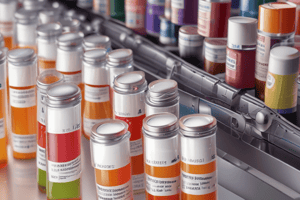Podcast
Questions and Answers
What is the science, art, and technology of enclosing or protecting products for distribution, storage, sale, and use called?
What is the science, art, and technology of enclosing or protecting products for distribution, storage, sale, and use called?
- Product protection technology
- Packaging (correct)
- Enclosure science
- Distribution science
Which type of glass is known as neutral or borosilicate glass?
Which type of glass is known as neutral or borosilicate glass?
- Type IV
- Type III
- Type II
- Type I (correct)
What is the purpose of the powdered glass test for glass containers?
What is the purpose of the powdered glass test for glass containers?
- To assess the color consistency of powdered glass
- To measure the density of powdered glass
- To determine the hardness of powdered glass
- To estimate the amount of alkali leached from the powdered glass (correct)
What is the test conducted to evaluate water vapor permeability for plastic containers?
What is the test conducted to evaluate water vapor permeability for plastic containers?
What is the primary purpose of packaging material for parenteral products?
What is the primary purpose of packaging material for parenteral products?
What is the type of glass known as general purpose soda lime glass?
What is the type of glass known as general purpose soda lime glass?
What should be done to the components before filling the vials with the sterile product?
What should be done to the components before filling the vials with the sterile product?
What should be done to monitor component performance during compatibility trials?
What should be done to monitor component performance during compatibility trials?
What should be examined before the experiment to ensure seal quality?
What should be examined before the experiment to ensure seal quality?
What determines the effect of light passing through the bottle wall on product stability and appearance?
What determines the effect of light passing through the bottle wall on product stability and appearance?
What should be done if terminally sterilizing the vials is part of the intended product operation?
What should be done if terminally sterilizing the vials is part of the intended product operation?
What should be done to determine seal quality after cycling vials through temperature and pressure changes?
What should be done to determine seal quality after cycling vials through temperature and pressure changes?
What is the purpose of the Water Attack Test (USP)?
What is the purpose of the Water Attack Test (USP)?
What does the Hydrolytic Resistance Test measure?
What does the Hydrolytic Resistance Test measure?
What is the purpose of the Arsenic Test for glass containers?
What is the purpose of the Arsenic Test for glass containers?
What does the Thermal Shock Test check?
What does the Thermal Shock Test check?
What is tested in the Leakage Test for containers?
What is tested in the Leakage Test for containers?
What Quality Control Tests are performed for closures?
What Quality Control Tests are performed for closures?
Study Notes
- The sample is washed with acetone and then undergoes several tests.
- Water Attack Test (USP) is performed on intact containers, specifically for treated soda lime glass. It determines the amount of alkali leached from the surface and estimates the leaching by heating the container.
- Hydrolytic Resistance Test rinses containers with water, heats them in an autoclave, and measures the volume of hydrochloric acid required to neutralize the alkali leached.
- Arsenic Test is for glass containers for aqueous parenteral use. It tests for arsenic contamination by heating the container with hydrochloric and hydroiodic acids and measuring the absorbance of the resulting solution.
- Thermal Shock Test checks the container's ability to withstand rapid temperature changes by moving the container between hot and cold water baths.
- The Leakage Test checks the container's integrity by filling it with a coloured solution under high pressure and checking for any leakage.
- Quality Control Tests for closures include preparing a sample by washing with anionic surface active agents, cooling and separating the solution, and testing for residue, sterilization, pH, and self-stability.
- Plastic containers undergo Quality Control Tests, which include a Leakage Test for plastic containers (filling with water, allowing to stand for 14 days at specific conditions, and checking for weight loss) and a Clarity of Aqueous Extract Test (checking for colourlessness and freedom from turbidity).
Studying That Suits You
Use AI to generate personalized quizzes and flashcards to suit your learning preferences.
Related Documents
Description
Test your knowledge of quality control tests for packaging materials of parenteral products with this quiz. Learn about the types of packaging materials, including glass and plastic containers, and the quality control tests required for ensuring the integrity of parenteral product packaging.




